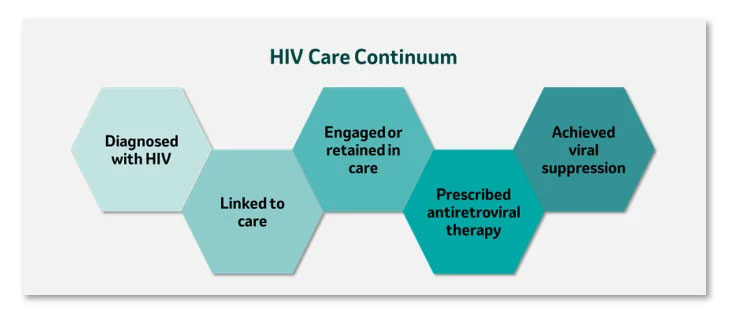Promoting equity in HIV/AIDS care
Approximately 1.1 million people in the U.S. are living with HIV, according to the U.S. Centers for Disease Control and Prevention (CDC). Although the incidence of HIV has declined, certain populations and geographic regions bear a disproportionate burden of new infections. Nearly half of all individuals newly diagnosed with HIV in the U.S. live in the Southern Region, and approximately three quarters of those diagnosed are people of color.1
Disparities in HIV care are substantial and persist throughout the HIV care continuum, frequently leading to poorer health outcomes. To help address these disparities, our company’s Foundation is supporting programs that are working to increase access to high-quality HIV care and helping to overcome the social and environmental factors that influence engagement in care for people of color living with HIV in the Southeastern U.S.
HIV Care Connect
Our company’s Foundation is supporting HIV Care Connect in the U.S., with a commitment of $7 million over five years (2019–2023) to reduce disparities in HIV care in the Southeastern communities that have disproportionately high rates of HIV.
HIV Care Connect has several goals:
- Improve linkage to and retention in high-quality HIV care for populations most affected by HIV
- Build sustainable collaborations between the health care sector and other sectors to overcome social and environmental barriers to care and treatment
- Improve health outcomes for people living with HIV, particularly in underserved communities
- Disseminate key findings and program results to advance best practices for improving HIV care across the care continuum

Program sites
Through grants to three organizations, the Foundation is supporting evidence-based programs to help promote sustainable improvements in the delivery of HIV care.
- Care Resource (Miami, Florida)
- Medical Advocacy and Outreach (Montgomery, Alabama)
- University of Mississippi Medical Center (Jackson, Mississippi)
The University of Alabama at Birmingham (UAB) serves as the National Program Office (NPO) for HIV Care Connect. It supports the grantee organizations’ program efforts to reduce disparities in HIV care and improve health outcomes. The NPO is also leading the cross-site evaluation of this initiative.
Program approach
Social determinants of health – factors such as economic stability, neighborhood and physical environment, education, stigma, and social circumstances – contribute significantly to disparities among people living with HIV in underserved U.S. communities. Addressing the social determinants of health and connecting individuals living with HIV to high-quality care, treatment, and support is critical in achieving and maintaining viral suppression, a key goal of treatment.
HIV Care Connect programs are:
- Implementing multifaceted strategies to improve long-term engagement in HIV care
- Strengthening multisectoral collaborations to address factors within and outside the health care system that affect access to HIV care and health outcomes
- Engaging the community in program development and implementation to ensure that interventions are tailored effectively to meet local needs
Through the cross-site evaluation, UAB will assess the impact of HIV Care Connect with the goal of identifying and promoting best practices to improve sustained access to high-quality HIV care among populations heavily impacted by HIV.
1 Centers for Disease Control and Prevention. HIV Surveillance Supplemental Report, 2019; 24(1). https://www.cdc.gov/hiv/pdf/library/reports/surveillance/cdc-hiv-surveillance-supplemental-report-vol-24-1.pdf